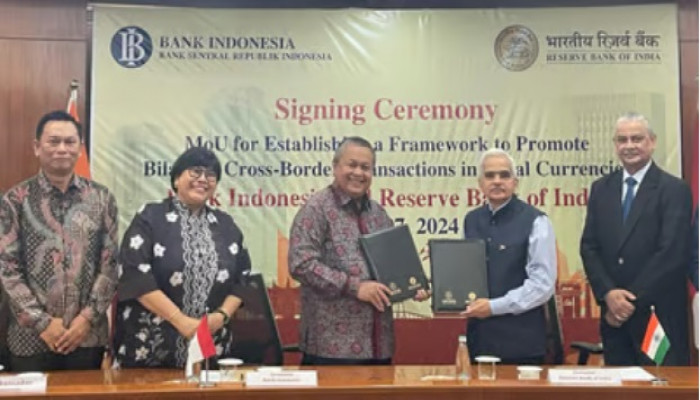
On Thursday, the Reserve Bank of India (RBI) and the Bank Indonesia (BI) signed a Memorandum of Understanding (MoU) in Mumbai to establish a framework to promote the use of local currencies for bilateral transactions.
“The MoU on establishing a framework for cooperation in the area of cross-border transactions in local currencies between India and Indonesia aims to promote the use of Indian Rupee (INR) and Indonesian Rupiah (IDR) bilaterally,” the RBI said in the release.
The MoU was signed between RBI Governor Shaktikanta Das and his Bank Indonesia counterpart Perry Warjiyo, the release said.
The MoU is aimed at facilitating the use of the Indian rupee and the Indonesian rupiah for “all current account transactions, permissible capital account transactions and any other economic and financial transactions as agreed upon by both countries,” according to a release by Bank Indonesia.
The RBI release said, “This collaboration marks a key milestone in strengthening bilateral cooperation between the RBI and BI. The use of local currencies in bilateral transactions will eventually contribute to promoting trade between India and Indonesia as well as deepening financial integration and strengthening the long historical, cultural, and economic relations between India and Indonesia.”
The central bank further said that this framework would enable exporters and importers to invoice and pay in their respective domestic currencies, which in turn would enable the development of an INR-IDR foreign exchange market. The use of local currencies would optimize costs and settlement time for transactions.
In 2022–23, the bilateral trade between India and Indonesia stood at $38.8 billion, compared with $26.2 billion in the previous fiscal year. Imports from Indonesia grew 63% to $28.8 billion in fiscal 2023, while exports rose 18% to $10 billion.
Last year, on July 15, the RBI entered into two Memoranda of Understanding with the Central Bank of the UAE. These agreements aimed to create a framework encouraging the utilization of local currencies in cross-border transactions and fostering collaboration in interconnecting their payment and messaging systems.
In October, India and Tanzania agreed on increasing the use of local currencies for trade. The two sides signed six agreements for cooperation in various sectors, including digital transformation, culture, sports, maritime industries, and white-shipping information sharing.
Malaysia is another country with which India entered into a pact to settle trade in Indian rupees. The framework was operationalised last April, with India International Bank of Malaysia opening a special rupee vostro account with Union Bank of India.
Image source: X
